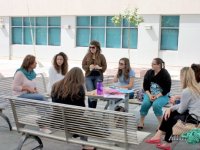Professional Learning Opportunities and the Teachers They Create
Professional learning is most effective when educators have the option to personalize the experience and communicate meaningfully with other educators who share their focus.
Over the past few years, professional learning structures have shifted dramatically. This has been a shift not so much in content or strategies, but rather in overall design of professional learning.
At its core, professional learning is the key component to improving educator practice and providing new perspectives on an ever-changing profession. While most content has remained consistent throughout time, instructional design, educational policy, and classroom tools and structures have been in constant motion. But with all of the demands of the classroom and the limited time in a school calendar, how do we pack all of the resources, strategies, and exemplars into only a handful of professional learning days? The simple answer is that we don't.
Professional learning opportunities should not be treated as if they were a test that we're all cramming for with only minutes left to study. Instead, professional learning should resemble a variety of unique threads that make up the fabric of an educator's professional career. It should be something that we desire and seek out, not dread. In most cases, educators have an innate desire to learn and grow professionally. In essence, this idea is the guiding principle and philosophy that moves education forward: the desire to be a lifelong learner and model the practice for our students so that they can one day emulate this concept.
Option-Based PD
So what does lifelong learning look like in the span of a school year, with limited time for professional learning? The answer is quite simple. And it's happening throughout the world, usually on a Saturday. In case you've been living under a rock, the answer is Edcamps. This is not to say that every facet of the Edcamp model has been perfected or that it will assimilate to every school system and learner. However, there are two key ingredients to which every school should pay attention.
The first ingredient is providing options to personalize your own professional learning in a collegial atmosphere. Professional learning, much like classroom learning, should not be embodied by an autocratic figure doling out information to be consumed and processed in isolation. Rather, school leaders who are tasked with developing professional development for a school should see themselves as facilitators of learning rather than top-down managers. This begins with gathering collective input through a PLC centered around professional learning.
At Grafton High School in Grafton, Massachusetts, Assistant Superintendent Tracey Calo has created this model. Our professional learning community meets regularly and discusses strategies and ideas for integrating meaningful, purposeful professional development. Over the past year, professional learning in Grafton Public Schools has not been something that teachers dread, but rather a series of opportunities to select learning options from a menu. The administration initially develops this menu by creating a request for proposals (RFP). The RFP goes out to all staff, and any educator, admin, specialist, etc. can submit session ideas. These ideas are then collected and shared with staff in a Google form that allows for selection and personalization of one's learning.
Focus, Engage, Listen, Process, and Act
The second ingredient in successful professional learning is allowing time for conversations and constructive debate. Thanks to the rise of nearly ubiquitous networks and connectivity, there are a myriad of ways to extend learning beyond the walls of any institution. However, I'm not about to tell you that Twitter chats and Voxer are the "greatest professional development ever!" While Twitter and Voxer are both great tools for connecting, they are merely efficiencies in the learning process. They offer convenient ways to connect, but ultimately are driven by shouting voices and minimal listening, processing, and acting.
The conversations I'm speaking about involve a speaker and a listener who are focused and engaged. Some of the best professional learning experiences I've had involved a simple conversation. When attending an Edcamp, you will see this unfold naturally. An Edcamp creates both time and space for all voices to be heard. It allows for both collegial debate and constructive criticism. Additionally, these offline conversations move at a pace that allows time for processing and reflection.
Ultimately, professional learning opportunities should be a natural part of an educator's professional life. But it is also the responsibility of school leaders to provide time and space for educators to grow professionally and engage in conversations around common ideas. Professional learning should also be a personalized experience that allows every educator the autonomy to select his or her own learning pathway and connect with like-minded colleagues. Being an educator does not simply mean that you're transferring information to students. Rather, you're someone who models to your students every day what it looks like -- and means -- to be an evolving learner.
